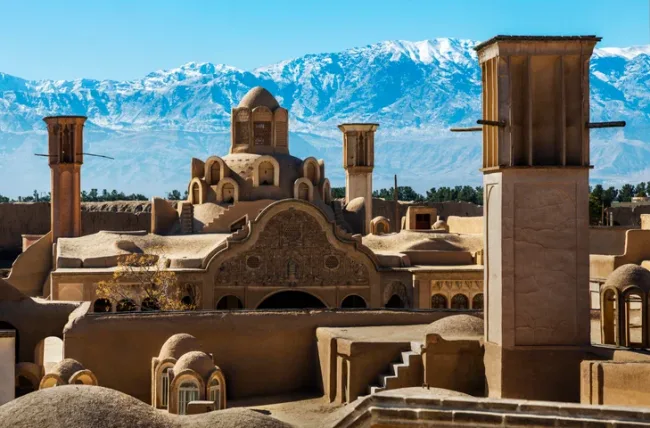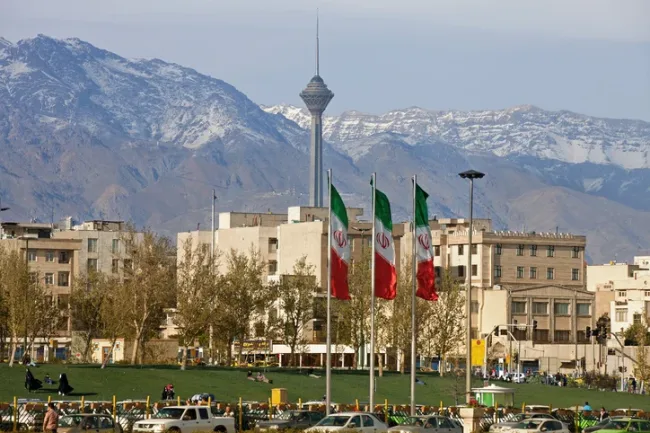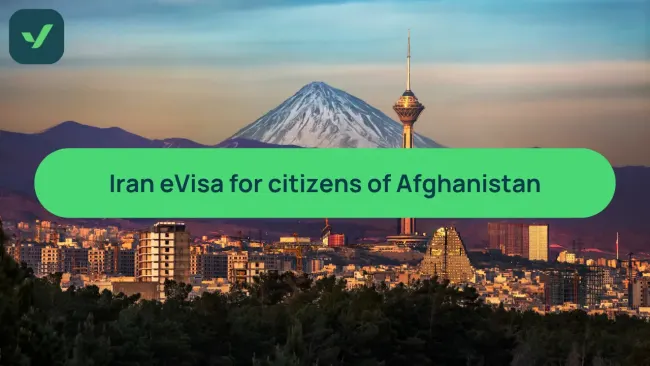
Iran
Welcome to Iran
Do you need a visa to enter Iran? If that question's been on your mind, you're in the right place. This blog is your go-to resource to figure out if a visa is necessary for your trip to Iran.

What’s an Iran eVisa and who’s it for?
Who’s the Iran eVisa for?
Nationals from more than 100 countries who need to apply for an Iran eVisa before entering the country, including Australia, Belgium, the USA, the United Kingdom, and more.
Who’s not eligible for an Iran eVisa?
Nationals from more than 30 countries that don’t need a visa to enter Iran, including the UAE, Saudi Arabia, China, India, and more.
Find out if you can travel visa-free or need to apply for an Iran eVisa with the Visa Checker Tool.
What’s the purpose of the Iran eVisa?
This visa allows travelers to visit Iran temporarily for business and medical purposes, as well as tourism and short-term visits, including sightseeing, visiting friends or relatives, and engaging in leisure activities.
How long can you stay with an Iran eVisa?
With an Iran eVisa, the length of your stay can vary, but generally, you're looking at being able to stay for up to 30 days on a Single entry basis.
What’s an Iran Pilgrimage Visa and who’s it for?
Who’s the Iran Pilgrimage Visa for?
The Iran Pilgrimage Visa, known as a Ziyarat Visa, is specifically designed for foreign Muslims wanting to engage in pilgrimage to Iran's holy sites.
What’s the purpose of the Iran Pilgrimage Visa?
The primary purpose is to allow Muslims to visit spiritual sites and partake in religious activities.
How long can you stay with an Iran Pilgrimage Visa?
Initially, the visa is valid for 30 days, but it can be extended up to 3 months once you're in Iran. If you wish to extend your stay, you must apply for an extension at the Police Office of Foreign Aliens in any major city in Iran before your visa expires.
What’s an Iran Transit Visa and who’s it for?
Who’s the Iran Transit Visa for?
Individuals who are not staying in Iran but need to pass through the country to get to their next destination.
What’s the purpose of the Iran Transit Visa?
To legally allow travelers to transit through Iran for a limited period without the intention of staying.
How long can you stay with an Iran Transit Visa?
The transit visa typically allows for a stay of up to 7 days, providing travelers enough time to cross Iran to reach their next destination.
What are the Iranian long-term visa options and who are they for?

Iran offers a variety of long-term visa options catering to different purposes. These visas are tailored for individuals intending to stay in Iran for extended periods. The common ones include:
-
Diplomatic and Service Visas: For diplomatic or consular staff or official guests of diplomats in Iran, allowing for activities like tourism and attending cultural events.
-
Education Visa: Aimed at foreign students and religious scholars for studies in Iran.
-
Temporary Work Visa: For foreign nationals, including skilled workers and specialists, coming to Iran for employment.
-
Media Visa: For foreign media personnel, such as reporters and cameramen, covering Iran.
-
Investment Visa: Available to foreign investors with official permission from Iranian authorities.
-
Marital Visa: For foreign men married to Iranian women, and their children, with officially recognized marriages.
-
Medical Visa: For those seeking medical treatment in Iran with an approval letter from an authorized medical center.
We currently don’t handle these long-term visa applications. For detailed information, requirements, and application processes for long-term stays in Iran, it's best to visit the Iran Ministry of Foreign Affairs website.
Staying healthy in Iran: Here’s what you need to know
Preparing your health for a trip to Iran is crucial for a seamless and enjoyable experience. Here's what you need to know about staying healthy, with a focus on necessary vaccinations and precautions.
Make sure to stay updated on routine vaccines
Ensure you're up to date with routine shots such as measles-mumps-rubella (MMR), diphtheria-tetanus-pertussis, varicella (chickenpox), polio, and your yearly flu shot.
Recommended vaccinations for visitors include:
-
Hepatitis A: Advised for most travelers, especially those visiting rural areas or smaller towns.
-
Hepatitis B: Suggested for travelers under 60 years old who haven’t been vaccinated.
-
Malaria: Travelers going to certain areas of Iran will need to take prescription medicine to prevent malaria. Depending on the medicine you take, you will need to start taking this medicine multiple days before your trip, as well as during and after your trip.
-
Polio: Adults who’ve been vaccinated should get a booster, and those who haven’t should complete the vaccination series before traveling.
-
Yellow fever: You must have a vaccination certificate if coming from countries with yellow fever risk.
-
Typhoid: Recommended for travelers visiting smaller cities, rural areas, or staying with friends and relatives.
-
Measles: Infants aged 6 to 11 months should receive an MMR dose before travel.
-
Rabies: Recommended for those spending significant time outdoors, in rural areas, or in close contact with wildlife.
-
Stay updated on Iran’s COVID-19 travel regulations, including quarantine, testing, or vaccine documentation, by consulting your airline or the Iranian Ministry of Health and Medical Education website.
Medical facilities
Iran provides a blend of public and private healthcare options. You'll find that medical services are particularly advanced in larger cities. However, in more remote areas, the available medical facilities might be limited.
-
International visitors and those in need of specialized care often choose private healthcare due to its wider range of services and access to specialists.
-
Pharmacies are readily available in urban areas and offer a variety of over-the-counter medicines. If you need specific prescription medication, it’s best to carry your own.
Health insurance
Before you head off on your journey, make sure you've got health insurance sorted.
Getting treated at private clinics or hospitals can get really expensive. You'll want to check that your insurance can handle big bills, especially if you need an emergency flight home.
Make sure your insurance covers you well, including:
-
Compensation for travel-related issues such as cancellations, delays, or disruptions.
-
Coverage for medical treatments and potential evacuations.
-
Reimbursement for lost baggage.
Things to be aware of when visiting Iran

Iran is a welcoming destination for visitors, but it's wise to be mindful of certain health precautions.
-
Cultural sensitivity: Iran is a Muslim country, and it's important to respect local customs and laws. Dress conservatively, especially when visiting public places like malls and restaurants. During the holy month of Ramadan, be mindful of restrictions on eating and drinking in public during daylight hours.
-
Food and water safety: Stick to bottled water and be careful with eating raw or not fully cooked foods to avoid getting sick.
-
Natural disasters: Many parts of Iran are at risk of earthquakes and tremors. These can be of high magnitude, cause damage to infrastructure, and put lives at risk. In addition, some provinces like Khuzestan and Golestan can suffer from floods in the spring. Make sure to follow the advice given by local authorities.
-
Environmental risks: Sand and dust storms are relatively common and can significantly reduce air quality. Those with respiratory conditions should take necessary precautions, such as staying indoors during severe storms and using air purifiers.
-
Local laws and etiquette: Familiarize yourself with local laws to avoid unintentional offenses. For example, public displays of affection are frowned upon, and photography of certain buildings, especially government and military facilities, is prohibited.
Medication for personal use
If you're packing medication for your trip to Iran, here's what you need to remember:
-
Declare all medications: Make sure to inform customs about any medicine you're bringing in, especially if it's something you need a prescription for or is a controlled substance.
-
Keep medicine in its original packaging: All medicine should stay in the packaging it came in, with the label that has your name and prescription on it.
-
Have a prescription or doctor's note: You should also have a letter from your doctor or a recent prescription with you, explaining why you need the medicine.
-
Check for restrictions: It's a good idea to check with the nearest embassy or consulate of Iran to make sure your medicine isn't banned or restricted there.
-
Pack only what you need: Bring just enough medicine for your trip to avoid any hassle.

 Australia ETA Online
Australia ETA Online
 United Kingdom ETA
United Kingdom ETA
 India Tourist eVisa
India Tourist eVisa
 Canada ETA Visa
Canada ETA Visa
 Turkey eVisa
Turkey eVisa
 Egypt eVisa
Egypt eVisa
 Singapore SG Arrival Card
Singapore SG Arrival Card
 Indonesia eVoa Visa
Indonesia eVoa Visa
 Aruba ED Card
Aruba ED Card

